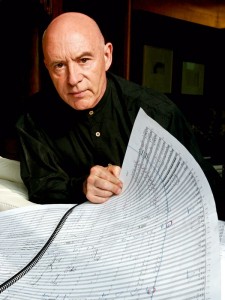Here in Houston, it isn’t just the bronze commemorative star in front of Jones Hall that honors the legendary German conductor Christoph Eschenbach. Loyal fans in the city honor him with their presence and rapt attention. The orchestra members honor him with their finest performances. For music-loving Texans, he is a hero in the truest sense, and we live in a time where authentic heroes are far and few between.

Maestro and the Houston Symphony offered a stunning performance of Mahler’s Symphony No. 5 last night, more than just a highlight in what has been a thrilling season. Eschenbach was music director of the Houston Symphony from 1988 to 1999. I wasn’t here during that period, but everyone with whom I’ve spoken says he was largely responsible for bringing the symphony to international recognition. When Eschenbach appeared in Houston last year, it’s possible that most fans bought tickets to see him rather than soloist Lang Lang.
He conducted the entire symphony from memory, which might seem unremarkable in view of his 71 years. He should know the Mahler 5th that well by now. But there is something beyond the technical considerations that is easy to discern but nearly impossible to describe.
Eschenbach’s interpretive skills are simultaneously intellectual and emotional. He has impeccable taste. In appearance, he has a dignified Patrick Stewart-as-Captain Picard-like sexiness. When you see him, you want to know him, and he reveals himself via the music. Further, he brings out something in players that transports them into a higher realm.
Within seconds, Eschenbach and the Houston Symphony pulled listeners deep into the throes of the opening Trauermarsch, which moved into an almost violent second “vehemence†movement. If we had applauded after the first two movements, I don’t think it would have been out of order. We’d already heard what could be construed as a complete symphony. After a pause, Eschenbach kind of danced his way through the Scherzo, reminiscent of Astaire. The result was nostalgic without being sentimental, if that makes any sense. I was particularly taken with the Adagietto, perhaps because there was just the right emphasis on the “ietto†aspect; it wasn’t an Adagio as it so often manifests. Paula Page’s harp was other-worldly.
A symphony that starts off with death and finishes with a rousing, life-affirming Rondo-Finale of fugal episodes is irrefutable. Eschenbach actually showed off three symphonies last night. After a long series of curtain calls (Maestro received a standing ovation at the beginning of the evening as well), we stepped out into the cold night transfigured.
Houston Symphony continues next month with “RachFest,†a series of Rachmaninoff concerts for which the promotional advertisement mimics a 1930s boxing poster. The tagline reads, “The Biggest, Baddest Showdown of the Century Will Happen at the Piano, Sergei Rachmaninoff vs. Kirill Gerstein.†Believe me, I’ll be there with my gloves on.



“Patrick Stewart-as-Captain Picard-like sexiness” – totally dead on!